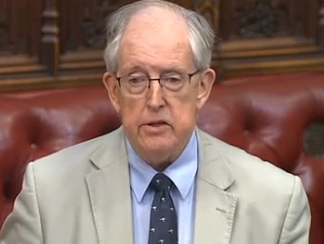
A Lib Dem peer has pledged to introduce a Private Member’s Bill designed to “update and improve” the Freedom of Information Act 2000 if Boris Johnson’s government fails to update it in the next Parliamentary session.
Lord McNally (pictured) said the act should be extended to cover private contractors working for public bodies because the Government spends almost a third of its total expenditure, £284bn each year, on external suppliers.
The figure was taken from a report published by the Information Commissioner in January which called for an update to the FOI Act and the Environmental Information Regulation 2004 to include organisations providing a public function.
The report said there was an “urgent need” for Parliament to consider reform due to the “challenge posed to transparency and accountability by the scale and complexity of organisations other than public authorities delivering public services”.
Speaking in the House of Lords, Lord McNally cited the Grenfell Tower fire in 2017, saying the disaster raised questions over the public’s access to information relating to social housing and the collapse of construction company Carillion last year.
Lord McNally said the latter event “highlighted the limits of information available, or not available, about outsourced public services and gave a stark warning to those who claim that FOI concerns can be better met by conditions written into contracts than clear rules written into legislation”.
“The need for a robust and effective FOI Act is more necessary and the need for its expansion and update more urgent than ever,” he added.
Lord McNally said Tuesday’s debate was tabled to let the incoming administration “know that if there is no legislation announced for the next session, I will seek to introduce a Private Member’s Bill to update and improve the FOI Act 2000”.
A similar Private Member’s Bill to widen the act was introduced by Labour MP Andy Slaughter last year but was not passed.
Slaughter said at the time he would continue working to get the bill, which “would have shone a light into organisations like Carillion, Serco, G4S and the TMO that managed Grenfell Tower”, into law.
A small number of peers joined Lord McNally’s call for reform.
Lib Dem peer Lord Scriven praised journalists at the Yorkshire Post, Sunday Times, ITV and BBC for exposing a “toxic culture” at tourist board Welcome to Yorkshire, a public body which turned private in 2009.
The Lib Dem peer said: “This has been going on for years.
“If we had had freedom of information, we would have been able to get this information many years ago, some of the excesses probably would not have happened, some of the people who carried out these excesses would have been sacked or got rid of earlier, and there would have been proper procedures, policies, spending and procurement in this organisation.”
He added that although questions about non-disclosure agreements have been asked of the body’s board under FOI, it is not subject to the act because “even though the organisation has spent over £10m of public money, it is not a public body”.
Lib Dem peer Lord Shipley also noted that trade magazine Inside Housing asked more than 60 housing associations for copies of their fire risk assessments two years ago.
“Very few responded,” he said. “Councils would have had to.”
The debate was welcomed by the News Media Association, which represents national, regional and local publishers from across the UK. It sent peers a briefing saying it hopes “the Government will bring forward measures for extension… to contractors performing public functions”.
Lord Young of Cookham, the Cabinet Office’s spokesperson in the Lords, said a review carried out by an independent FOI commission in 2016 found that extending the act to private companies that provide public services “would be burdensome and unnecessary”.
Lord Young said increasing the “reporting burden” on small and medium sized contractors “risks reducing for those SMEs the attractiveness of government as a buyer and therefore might weaken the resilience of our market and reduce the value for money that government is able to deliver”.
He added that although supplier failure does sometimes happen, “extending FOI to the organisations would not, I believe, help prevent it.
“Financial information is often commercially confidential and is therefore exempt from disclosure under the act,” he added.
Picture: Parliament TV
Email pged@pressgazette.co.uk to point out mistakes, provide story tips or send in a letter for publication on our "Letters Page" blog

